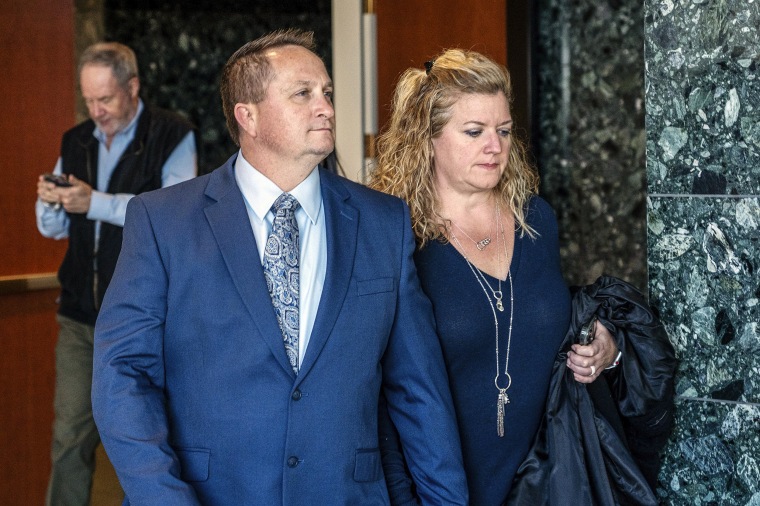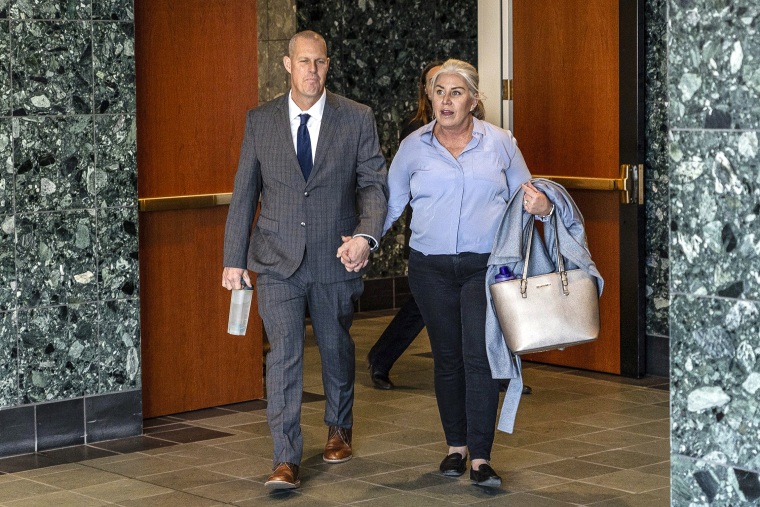[ad_1]
A Colorado jury on Friday convicted two paramedics in the death of Elijah McClain, a Black pedestrian, who was given a lethal dose of ketamine in 2019 after a confrontation with police.
Peter Cichuniec and Jeremy Cooper were found guilty by a jury of criminally negligent homicide. Cichuniec was also found guilty of assault in the second degree through the unlawful administration of drugs.
Cooper was acquitted of two assault charges against him. Cichuniec was acquitted of one of the two assault charges. The judge ordered Cichuniec to be remanded into custody after the verdict, and the bond for Cooper was continued.
Cichuniec and Cooper, who were suspended after being charged, were among five first responders who were criminally charged in connection with McClain’s death.

Outside of court after the verdict, McClain’s mother, Sheneen McClain, joined by community organizer MiDian Holmes, held a fist in the air, repeated her son’s name, and said she loved him.
“We did it, we did it, y’all,” Sheneen McClain said as she walked away from court.
Colorado Attorney General Phil Weiser said that his office knew that prosecuting the cases would be difficult but that justice demanded it.
“Elijah did nothing wrong. His life mattered. He should be here with us today,” Weiser said after the verdicts.
Aurora Police Officer Nathan Woodyard was acquitted Nov. 6 on charges of reckless manslaughter and criminally negligent homicide.
Woodyard had been suspended after being indicted but was eligible to return to work after being cleared.
A jury on Oct. 12 convicted Officer Randy Roedema of criminally negligent homicide and third-degree assault. Roedema’s sentencing was set for Jan. 5.
That same panel found Officer Jason Rosenblatt not guilty of reckless manslaughter, criminally negligent homicide and assault.
Rosenblatt was fired after it emerged that he texted “ha ha” to fellow officers who had texted him a picture of a memorial honoring McClain.
The trials stem from actions taken Aug. 24, 2019, after McClain purchased iced tea from a corner store and was walking home when police confronted him.
Officers were responding to a report of a suspicious person wearing a ski mask and waving his arms. McClain regularly wore masks because of a blood condition that made him feel cold, family members have said.
McClain told officers he was an introvert and asked them to “please respect the boundaries that I am speaking,” according to bodycam video of the confrontation.
Woodyard appeared to be the first person to talk to McClain and touch him after saying: “Stop, stop stop, stop, I have a right to stop you because you’re being suspicious.”
McClain said he was going home and asked to be left alone, footage showed.
He was eventually tackled by officers, who said they believed he was reaching for one of their guns. There’s been no evidence that showed McClain trying to take a police officer’s firearm.
Woodyard put McClain in a chokehold that forced him into unconsciousness, prosecutors have said.
Responding paramedics Cichuniec and Cooper injected McClain with the powerful sedative ketamine after police video showed him writhing on the ground, saying, “I can’t breathe, please,” and throwing up. He apologized for vomiting.


After being injected, McClain had no pulse in the ambulance, went into cardiac arrest and died Aug. 30, 2019.
The Adams County coroner found that McClain died from “complications of ketamine administration following forcible restraint.”
An independent probe commissioned by the city of Aurora found that police had no justification to stop or use force to detain McClain, and responding paramedics sedated him with ketamine “without conducting anything more than a brief visual observation.”
McClain, who was 5-foot-7, 140 pounds, was given an amount of ketamine appropriate for a 190-pound man, the probe found.
That report also stated that policies should better spell out the duties of paramedics responding to a police scene and that those medics not act as an “arm” of law enforcement.
Aurora Fire Rescue Chief Alec Oughton in a statement Friday expressed condolences to McClain’s family and said he was “deeply concerned and disappointed” that Cichuniec and Cooper were convicted.
“While I appreciate the jury’s diligence, integrity and public service to ensure a fair trial, I am discouraged that these paramedics have received felony punishment for following their training and protocols in place at the time and for making discretionary decisions while taking split-second action in a dynamic environment,” he said.
Oughton said the department has made changes in the wake of McClain’s death, including re-establishing a medical branch to increase oversight of emergency procedures and incidents, and a required review of the use of sedatives.
McClain’s death prompted months of protests demanding justice and police reform. The case garnered more national attention in 2020 after George Floyd was murdered by then-Minneapolis Police Officer Derek Chauvin.
 FARRATA NEWS Online News Portal
FARRATA NEWS Online News Portal






